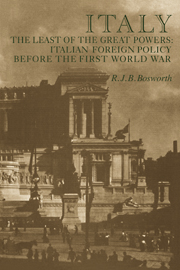Book contents
- Frontmatter
- Contents
- Dedication
- Preface
- List of maps
- 1 Society and politics in Liberal Italy
- 2 New political pressure groups and foreign policy
- 3 The making of a Foreign Minister: Antonino Di San Giuliano
- 4 The Consulta: the bureaucrats of foreign policy
- 5 How Italy went to Libya
- 6 How Italy stayed in Libya
- 7 The politics of alliance: Italy in the Triple Alliance, 1912–1914
- 8 The politics of friendship: Italy, the Triple Entente, and the search for a new Mediterranean agreement, 1911–1914
- 9 ‘Un cliente maleducato’: Italy in the Dodecanese and Ethiopia, 1912–1914
- 10 Preparing to digest some spoils: Italian policy towards Turkey, 1912–1914
- 11 San Giuliano's epilogue. The realities of European war 28 June to 16 October 1914
- Conclusion
- Appendix I The Ten Commandments for Italians abroad
- Appendix II Pro-memoria on our politico-military situation, by A. Pollio
- Appendix III San Giuliano's poem about his funeral ceremony
- Abbreviations used in the notes and bibliography
- Select bibliography
- Notes
- Index
6 - How Italy stayed in Libya
Published online by Cambridge University Press: 16 November 2009
- Frontmatter
- Contents
- Dedication
- Preface
- List of maps
- 1 Society and politics in Liberal Italy
- 2 New political pressure groups and foreign policy
- 3 The making of a Foreign Minister: Antonino Di San Giuliano
- 4 The Consulta: the bureaucrats of foreign policy
- 5 How Italy went to Libya
- 6 How Italy stayed in Libya
- 7 The politics of alliance: Italy in the Triple Alliance, 1912–1914
- 8 The politics of friendship: Italy, the Triple Entente, and the search for a new Mediterranean agreement, 1911–1914
- 9 ‘Un cliente maleducato’: Italy in the Dodecanese and Ethiopia, 1912–1914
- 10 Preparing to digest some spoils: Italian policy towards Turkey, 1912–1914
- 11 San Giuliano's epilogue. The realities of European war 28 June to 16 October 1914
- Conclusion
- Appendix I The Ten Commandments for Italians abroad
- Appendix II Pro-memoria on our politico-military situation, by A. Pollio
- Appendix III San Giuliano's poem about his funeral ceremony
- Abbreviations used in the notes and bibliography
- Select bibliography
- Notes
- Index
Summary
By 11 October Italian forces were firmly in control of the town of Tripoli, and by the end of the month all the major coastal centres, Tobruk (on 4 October), Derna (18 October), Benghazi (20 October) and Homs (21 October) had fallen to Italian arms. So much was military triumph. But, among the troops, the first cholera victim had died on 11 October, and contrary to the optimistic predictions of Galli, De Martino, and the press, the local Arabs did not flock to enrol beneath the banners of the new Rome. Instead, with sporadic help from the Turkish authorities, they resisted Europeans who had come to take away their land and their religion.
Victory by the seizure of a few towns, by ‘sending a gunboat’, if that was what Italian public opinion and politicians had expected, thus proved illusory. As Giolitti had himself earlier warned, a short war against ‘poor black simpletons’ was not enough. There were international ramifications.
Indeed, potentially, Europe was now confronted by a major contest between two acknowledged members of the Concert of Great Powers, even if their power was more titular than real. It was the first war between historically Great Powers since before the Congress of Berlin. The coup in Bosnia–Herzegovina, the struggle for influence in Morocco, the Boer War, the Cretan revolution, the various Balkan skirmishes, even the Russo-Japanese War, involved different diplomatic assumptions, and were different in kind from a real war between Italy and Turkey. Rapid action in Libya was perhaps tolerable. But a full-scale Italo-Turkish conflict would strike at the very basis of the Concert. The Balkans might erupt, and the massive Ottoman Empire might disintegrate.
- Type
- Chapter
- Information
- Italy the Least of the Great PowersItalian Foreign Policy Before the First World War, pp. 165 - 195Publisher: Cambridge University PressPrint publication year: 1979



